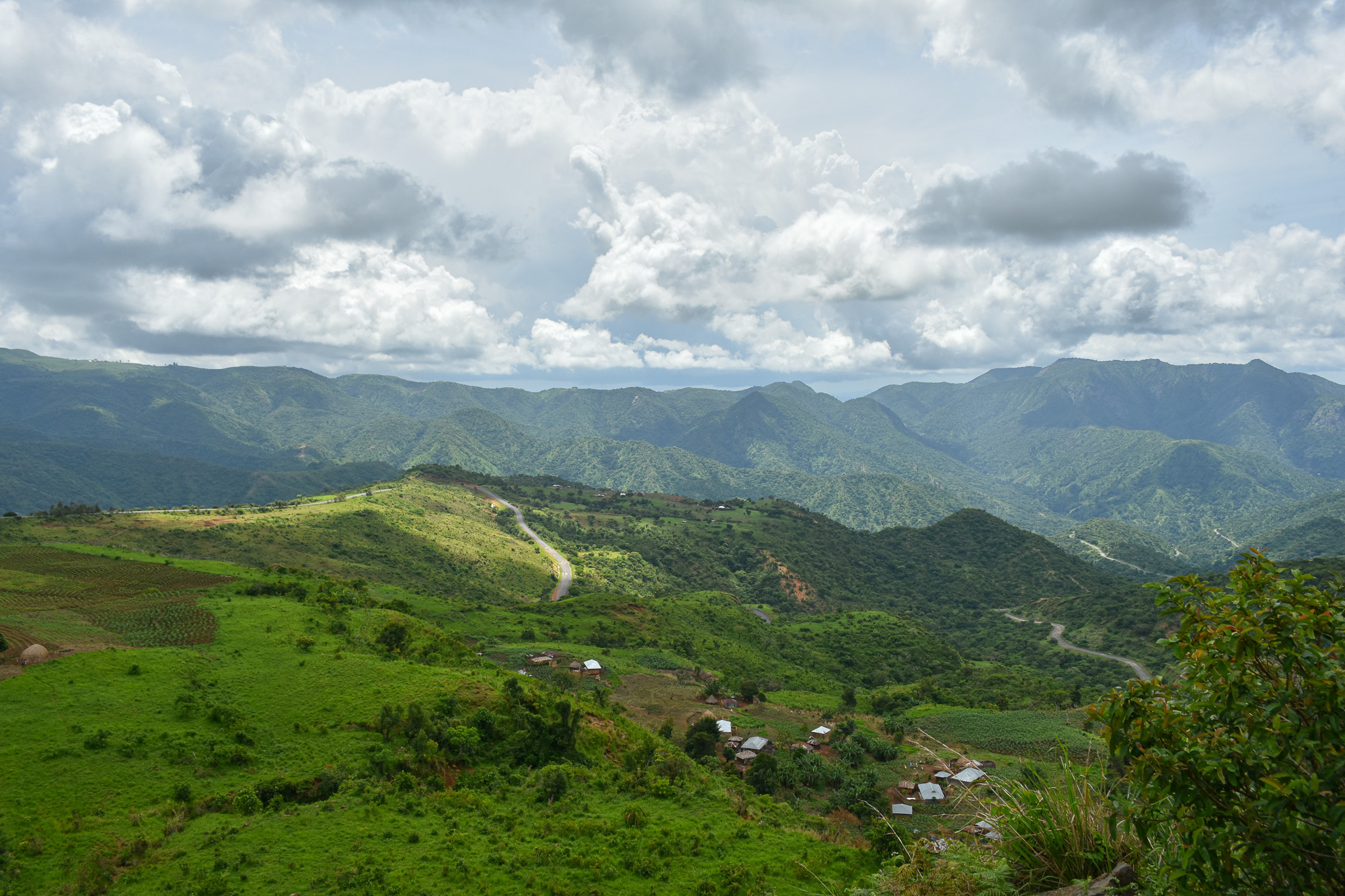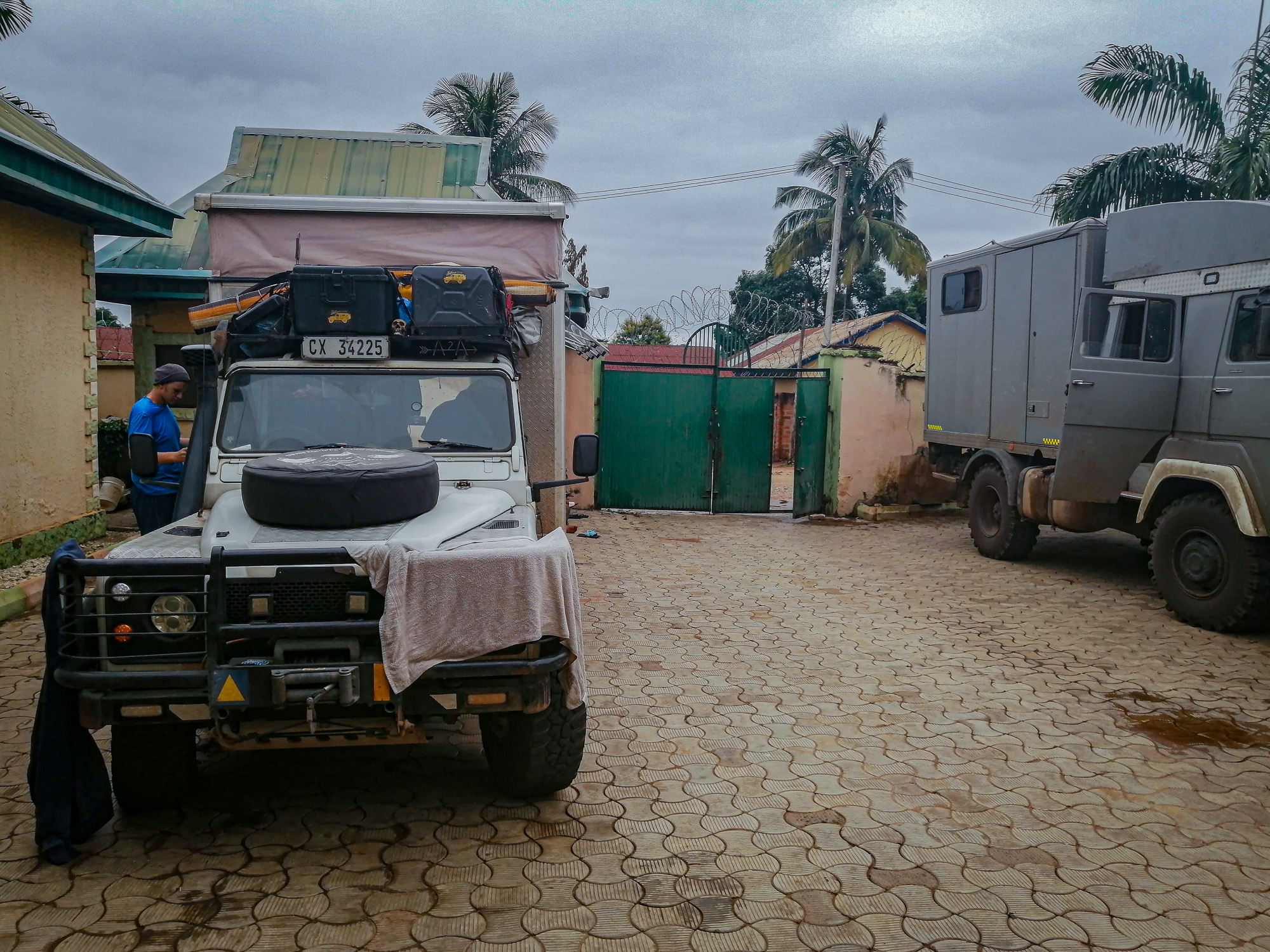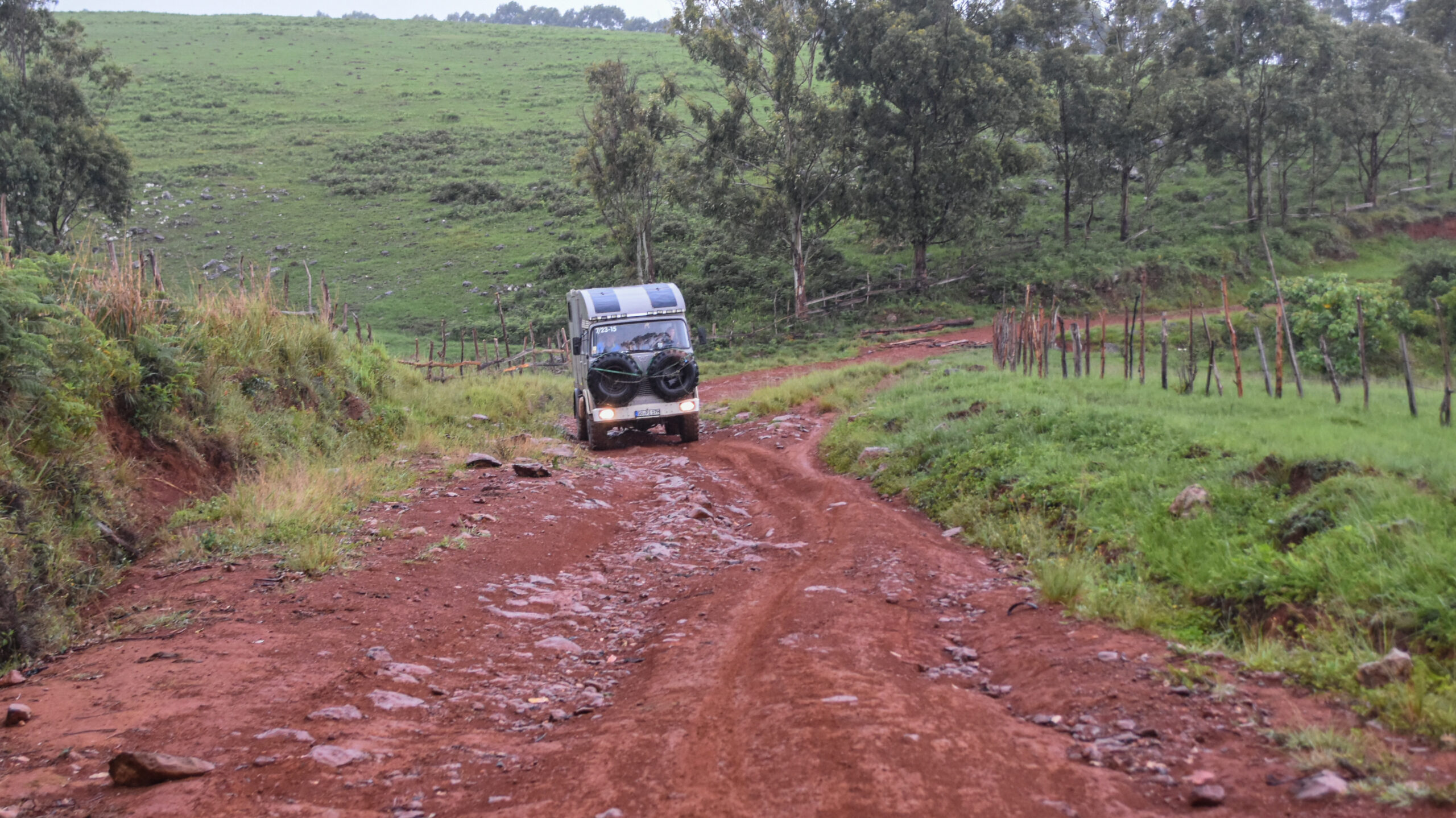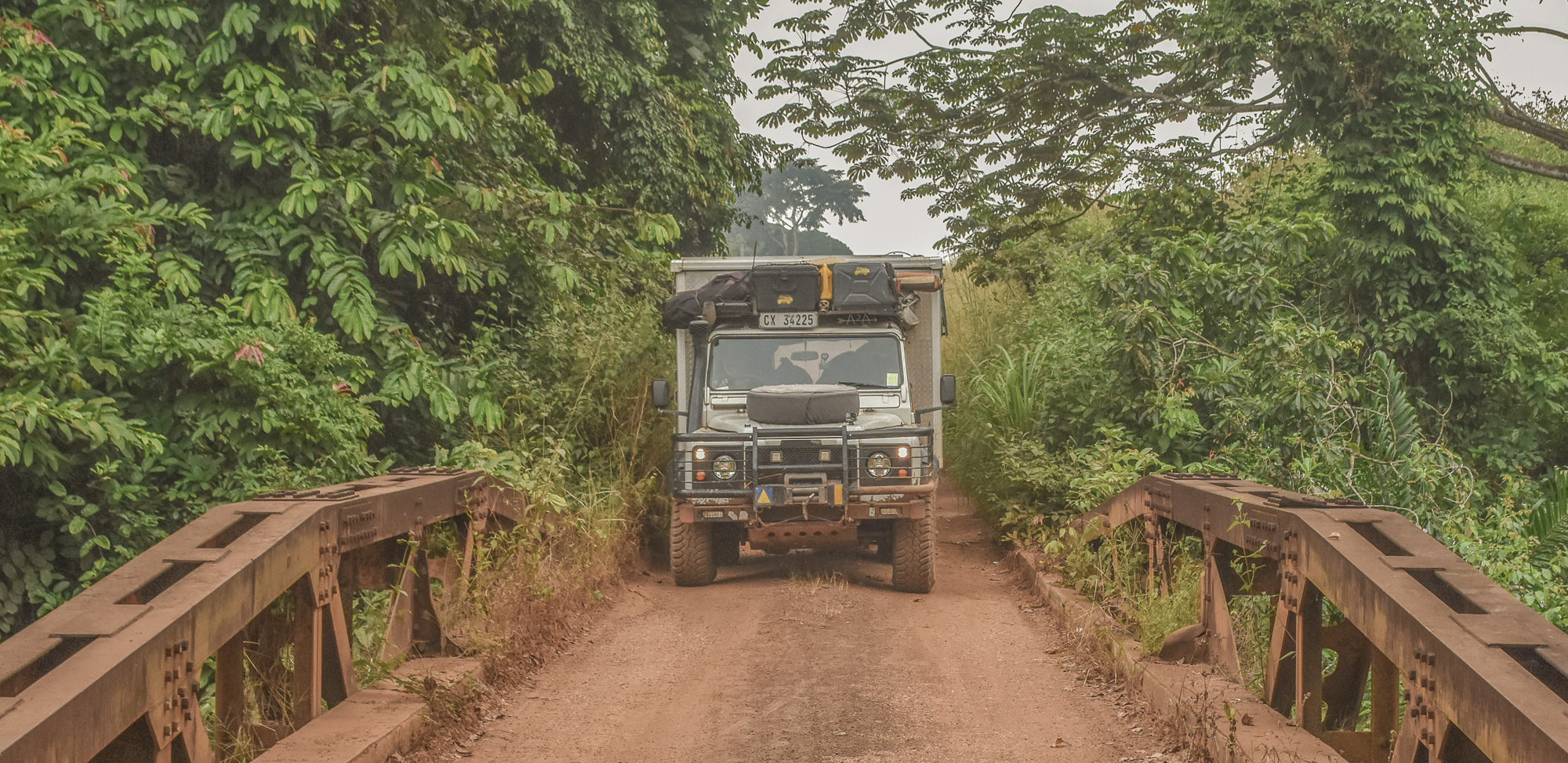A shot rang out, followed by a scream, loud and very close—too close. Our new Nigerian friends scattered as one without hesitation, cowering as they ran as if expecting a hail of bullets. They disappeared into the building beside which we were camped, leaving us bewildered, on our feet, and alarmed. There had been a murder, and this was one of the most unstable areas in Africa.
It was late May 2019, and our family of four was driving the length of West Africa in a dispirited, temporary convoy through one of the most dangerous areas of Nigeria. We were in a corner of the country sandwiched between the volatile, oil-rich Niger Delta and areas controlled by radical Islamist Boko Haram, the region famed for criminal gangs, kidnap, and murder. There was no other route from Benin to Cameroon—Niger, Chad, and the Central African Republic were no-go zones. Our convoy consisted of three vehicles: our Land Rover Defender, a British couple in their Defender, and a German family of five driving an ancient and unreliable Magirus Deutz truck. We had come together in Benin to support each other through Nigeria, collectively accepting the risk after being assured by recent reports from overland travelers who had crossed this terrain unmolested. Overland travelers are not targeted by the gangs of “bandits” or radical Islamists, and there had been no contemporary reports of violence or attacks on travelers or foreigners. Our children were both in their late teens, and we have traveled Africa and the Americas extensively; we are highly experienced travelers. Despite the crime epidemic in South Africa, greater Africa has always welcomed us with open arms. We knew that respect earns respect, and throughout our travels across 26 African countries, we seldom had cause for serious concern.
A few days before the murder in Katsina-Ala, we had left Lagos knowing that one of the most dangerous and challenging stretches of the West African journey lay ahead of us. From Enugu to the highlands, we would follow an off-road trail through the Gashaka-Gumti National Park to reach Cameroon while attempting to avoid the civil war there.

The road was challenging, not merely due to the unpredictable surface and drivers (we passed a long-dead body lying beside the road) but also by the sheer number of military and police roadblocks. At Ogoja, we were stopped for the tenth time that day by a policeman who asked where our front number plate was. We told the officer that it was displayed on the roof rack, and he spent a few minutes contemplating the number plate before returning to ask for my driver’s license and passport, which he contemplated for another 10 minutes. Eventually, after noticing our pent-up frustration, a colleague approached and said, “Don’t be offended; we are the Nigerian anti-kidnapping unit.” This announcement did not make us feel safer—quite the opposite.
Surprisingly, our spirits were relatively high despite illness, terrible roads, heat, and constant roadblocks. We arrived alone in an infamous town called Katsina-Ala late in the afternoon, located the Smile View Hotel, and drove into the secure, walled compound where the British and German trucks stood waiting for us. We had separated the day before when we insisted on taking our daughter, Jessica, to a clinic to treat her malaria and then waiting for her condition to stabilize. It was amazing how quickly Jessica’s health had improved in the days since the malaria diagnosis; Coartem is a fantastic drug and effectively renders malaria impotent (if only there were an equivalent pharmaceutical for the resulting flu-like symptoms that continued to plague Luisa and me). There are still a million malaria deaths each and every year in Africa, a shocking statistic, despite the apparent best efforts of NGOs and aid organizations distributing nets and treatment. We are fortunate that the handful of dollars needed to diagnose and treat such a dangerous and deadly disease is easily spent and not soon missed; the majority of Sub-Saharan Africans do not enjoy the same luxury.
With Jessica safely in bed, attended to by her brother Keelan, the Land Rover prepared for a night parked between high concrete walls and a tall, green steel gate. I sat with the hotel staff and watched Tim, the German scientist, work on his truck—again. Tim spent most of the evenings working on the Magirus Deutz, repairing the camper panels, preventing leaks into the camper, and maintaining the vehicle. This evening, he was attempting to fabricate a raised air intake as the roads had been wet and muddy, and we were traveling in the wet season. The hotel staff and their friends were affable and relaxed, helping Tim, telling jokes, and chatting with me about South Africa, Europe, and the USA. We had a pleasant “camp” arranged between the three vehicles, all facing the main, single-story structure shaped like an L, with the main building of rooms and reception and a wing that extended to the left of our parking lot camp. The sun had begun to set, and a meal at the end of another steaming day relaxed us. Tim’s wife, Pia, fed her children while Tim tinkered; Luisa tidied the Landy; and the British kept themselves busy. Conversation filled the air.



The shot rang out just before sunset, and the scream pierced the air. The men with whom we sat dispersed as if they had been expecting violence and were well accustomed to it. They disappeared into the motel building, leaving us to fend for ourselves. After a stunned moment, Luisa and I kicked into action, quickly and quietly locking the kids in the room. After we packed away the tables and chairs, removing the evidence of our relaxed late afternoon, we instructed our convoy mates to hide in their trucks. Sporadically, locals ran onto the property through the large green gate (which was eventually slammed shut and locked) and another smaller gate at the end of the left wing. They, too, ran cowering, shoulders slumped, heads protected from feared bullets. The sun vanished, and night arrived, suddenly dark and ominously quiet. The entire town became dead silent as all her residents hid from those who terrorized the night—time stood still.
A large, powerfully built man dressed in fatigues rushed into the courtyard, a Kalashnikov assault rifle in hand at the ready—our worst fear realized. He ran into the motel shouting and emerged with two tall, thin, young staff members who he ordered to lay on the ground as I stood sheltering Luisa deep in the shadows only 2 meters away. The militant picked up a metal rod and began beating the men viciously, shouting, “Where is the gun? Where is the gun?”
The prostate men shouted that they did not know, their hands held open before them, protesting, pleading, and protecting. The aggressor looked over the vehicles and then left, taking the men with him. Absolute quiet returned.
Too soon, the Englishman started chatting to Tim excitedly while Tim noisily mounted his bicycle on the back of his truck, their loud, conspicuously European voices breaking the silence. I instructed them to be quiet and remain hidden, explaining that when the locals return to normal, only then can we relax. Luisa left to care for and protect our children while I returned to the shadows, ready to act—not as a hero or an innocent, but prepared to intervene to protect my family and friends, ready to diffuse a situation, hoping to ensure that we could all stay safe in this infamous Nigerian kidnapping zone. Coming of age in South Africa during the dying days of apartheid, I had experienced another world to that of my European travel companions. Late-night assault rifle fire had erupted very close to my high school boarding school at the edge of the Munsieville township after a visit by the firebrand Winnie Mandela; our hostel master patrolled the corridors, pistol in hand; there were regular bomb drills, and I’d witnessed unrest over the years, along with a few guns being shoved in my face. I could only assume that these men, my companions, could not fathom the true danger of the situation we were faced with that night. I felt oddly calm, the metallic taste of fear and adrenaline in my throat.
The militant returned, his attention now turned to our vehicles. I stepped out of the shadows and offered my hand with a confidence that surprised me. The man shook it, and I found myself briefly holding the hand which had undoubtedly delivered death—to how many I did not know.
“My name is Rob. What is your name?”
“My name is Commando; I am Nigerian Special Forces. Where is your security detail?” he barked.
“They are coming now—five minutes,” I lied.
“Where are you from?”
“I am South African; we are heading to Cameroon,” I responded.
“A woman was murdered, now, outside the gates. Are there men here with guns?”
“No, sir. I only saw the staff.”
“Stay inside. You are safe.” These were hollow words from a man who had just beaten innocent men with a metal rod.
With that, he left, and I waited, wondering what would happen next and whether the man who claimed to be Nigerian Special Forces was, in fact, in the service of the government. An eternity passed, and eventually, the town came back to muted life. Radios played quietly, vehicles clattered by on the dirt road stained with blood, and an air of tense calm returned to Katsina-Ala.
Tim left his truck and headed back to the hotel room. As he approached the entrance, two young men emerged from the hotel, greeted him with huge smiles of relief, clapped their hands, and declared, “You are free! You are free!” Tim ignored the men and brushed past them. I approached the one man and asked, “Why are you surprised that he is free?” The young man’s smile faded as he replied, “No, everything is OK; I am just happy to see him.”
I continued questioning, but he refused to confirm what I already knew. The conversation spooked me; eleven “European” travelers must have presented a tempting target for any professional kidnapper gang. The night was not yet over and would be long.
My family remained locked in the room while I sat in the Land Rover for two hours, watching and waiting. Eventually, at midnight, I slipped out of the Land Rover and locked up before joining my family in the room, pushing a large armchair against the door. There I sat all night, trying to stay awake, listening to every sound. It was a very long night indeed, and when a large storm broke, I permitted myself to sleep for an hour or two before the sun rose. We prepared to evacuate, tired but relieved.
The following day was fraught with tension and bittered by exhaustion. Our self-appointed convoy leader, the Englishman, made poor decisions, taking the wrong route despite protestations, eventually leading us to our overnight destination as the sun set. Our lead then took issue with an agitated soldier at yet another roadblock, arguing and refusing to allow his vehicle to be searched and attempting to drive away. We all found ourselves staring down the barrel of a cocked Kalashnikov, the safety off and an aggressive finger on the trigger. The convoy community came to an end that night as we camped in a police station yard, nerves frayed. The British couple left alone in a hurry that morning once I had consulted the police chief and ascertained that we did not need an expensive police escort. My research indicated that the road and security situation improved significantly on the approach to the Gashuka-Gamti National Park.

Optimism had returned with the sun, and the German family followed us up into the cool highlands where we would spend the next three days in low-range 4WD, negotiating the muddy trail through an area of immense beauty until we emerged in a region of Cameroon unravaged by the civil war there.
Mere weeks after we left Katsina-Ala, Chief Press Secretary of Benue State Ede Ogaba Ede announced that a curfew was being imposed by the military “as part of efforts to restore peace and ensure the security of lives and property in that part of the state.” Acting Governor Engineer Benson Abounu pressed the people to obey the curfew and cooperate with security operatives.
To be honest, I did not escape the experience unscathed. My solace comes from the knowledge that I carried the burden for my family, they were not traumatized by the experience, and that I successfully protected them. I also appreciate that my travel companions also were suffering from incredible stress and dealt with that stress the only way they knew how. We were lucky.
We continue to travel, and since those difficult days in Nigeria, we have explored Southern and East Africa before returning to the USA and Latin America. The world is generally safe, and her people are kind, generous, and wonderful. To allow this experience to forever taint our love of exploration would have done us a terrible disservice and is something we never considered for a moment.
Editor’s Note: “Survivors” was originally published in Overland Journal’s Fall 2023 Issue.
Our No Compromise Clause: We do not accept advertorial content or allow advertising to influence our coverage, and our contributors are guaranteed editorial independence. Overland International may earn a small commission from affiliate links included in this article. We appreciate your support.
Read more: Slow is the Way to Go by Graeme Bell


